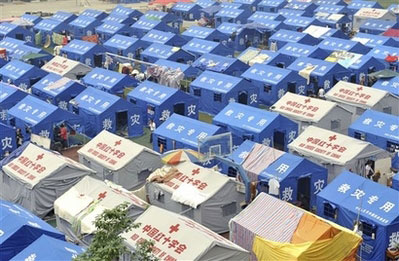Post-quake challenge: 5 million homeless
(chinadaily.com.cn/Agencies)
Updated: 2008-05-21 09:34
Updated: 2008-05-21 09:34
A giant, colorful pile of donated clothing lies in one corner, and dozens of women looking through it. Men in red vests regularly sweep and clean the area. Another area is a donation drop-off for a stream of well-wishers from neighboring villages.

Victims settle in temporary tents at the Agricultural University in Dujiangyan of southwest China's Sichuan province, Friday, May 16, 2008. [Agencies] |
Among them was Tan Xuqiong, a 36-year-old teacher who came with her 18-year-old son to drop off boxes of water, food, and medicine.
"My hometown was only slightly affected. When I see these people living like this, I feel very sad. The contrast is shocking," said Tan, who is from Deyang city.
Each person in the camp receives regular daily rations: three bottles of water, a package of instant noodles, bread, and some crackers. Families also received small radios and copies of the local Mianyang Daily newspaper.
Loudspeakers regularly blare announcements about hygiene and reminders to get daily health checks -- a precaution against possible disease outbreaks.
The clinic is staffed by eight physicians and six nurses — all volunteers with China's Red Cross. Running from 6 am to 11 pm, the medical staff sees about 1,000 patients a day, said Ye Mao, a 51-year-old orthopedic surgeon from southern Guangdong province.
"The biggest problem is the density of the camps. If an infection breaks out, it can spread very quickly," he said. No outbreaks have been reported.
A Russian mobile hospital arrived Tuesday in the provincial capital of Chengdu, Foreign Ministry spokesman Qin Gang said, and other medical teams were headed in from Germany, Italy, Japan, Taiwan and Hong Kong.
|
||
|
||
|
|
|
|

